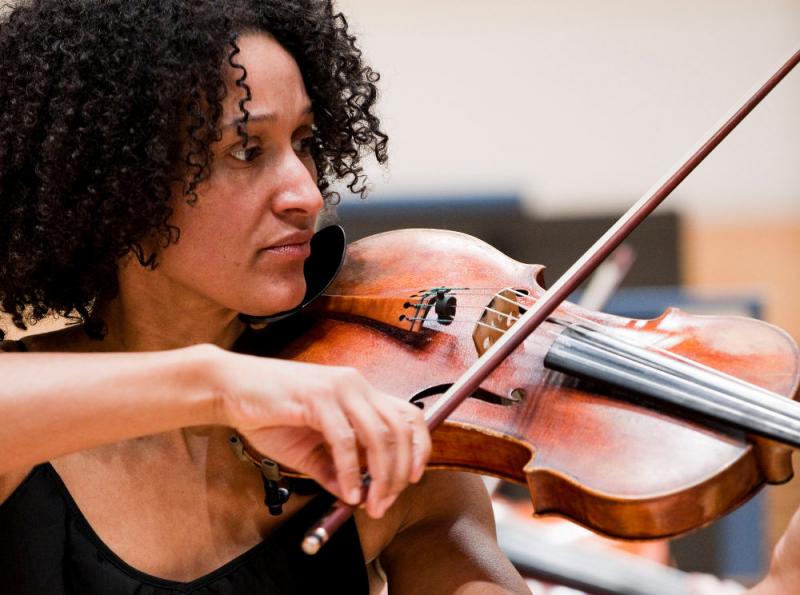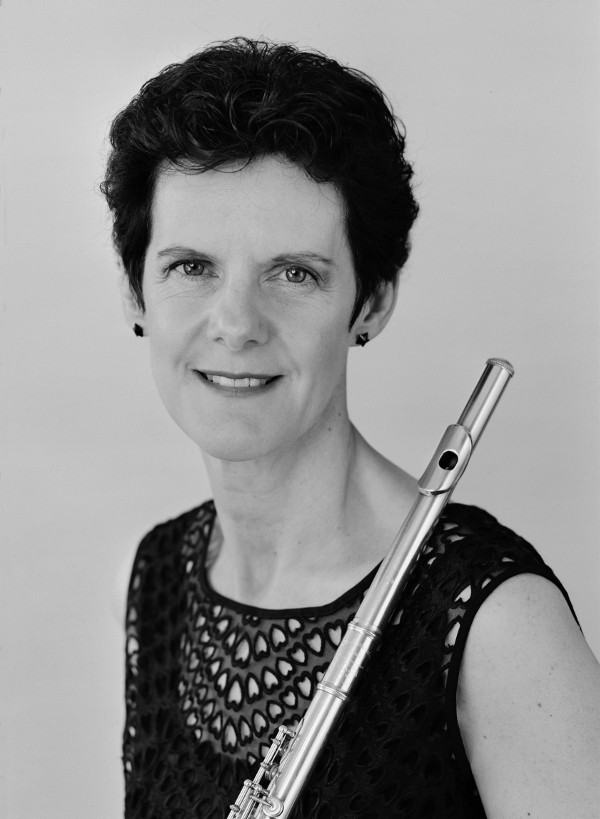Mitchell, Atkins, Johnston, Queen's Hall, Edinburgh | reviews, news & interviews
Mitchell, Atkins, Johnston, Queen's Hall, Edinburgh
Mitchell, Atkins, Johnston, Queen's Hall, Edinburgh
A voyage around Debussy launches the Scottish Chamber Orchestra's 2016 chamber recitals

It was a simple yet beautifully elegant way for the Scottish Chamber Orchestra to kick off its 2016 chamber concerts: a recital for flute, viola and harp, with Debussy’s beguiling Sonata as the centrepiece, and other contrasting music for the same trio orbiting around it.
And it was a similarly sensible decision for the orchestra to spotlight two of its principal players – flautist Alison Mitchell (pictured below) and violist Jane Atkins (main picture) – who joined together in what felt like an entirely unforced, natural partnership, both equally supple in phrasing and tonal variety, alive to each other’s nuances, yet with enough coolness to allow the music to speak for itself. Harpist Eleanor Johnston, however, seemed at times to struggle to match the crisp definition of her colleagues’ playing.
 Things began in a strangely low-key way with a Fauré-esque 1905 Terzettino by Théodore Dubois, predating the Debussy Sonata by ten years, and a million miles away in terms of texture and invention, but given a characterful account nonetheless. Bax’s Elegiac Trio, written just a year after the Debussy but almost certainly entirely unconnected with it, was a Celtic fantasy gently suffused with melancholy – a strangely muted memorial to Bax’s friends who had died in the 1916 Easter Uprising – but performed with sensitivity.
Things began in a strangely low-key way with a Fauré-esque 1905 Terzettino by Théodore Dubois, predating the Debussy Sonata by ten years, and a million miles away in terms of texture and invention, but given a characterful account nonetheless. Bax’s Elegiac Trio, written just a year after the Debussy but almost certainly entirely unconnected with it, was a Celtic fantasy gently suffused with melancholy – a strangely muted memorial to Bax’s friends who had died in the 1916 Easter Uprising – but performed with sensitivity.
It was in harpist Carlos Salzedo’s transcription of Ravel’s piano Sonatine (as a Sonatine en trio) that the contrasts between the three players became most evident, with Mitchell and Atkins lively and characterful in their invented parts, but Johnston articulating the harp part (at times more or less a reiteration of the piano original) with far less definition, so that much of Ravel’s expressive harmony went unheard, especially in the very brisk opening movement.
Performances were stronger elsewhere, however – in a sensitive, captivating account of Takemitsu’s Emily Dickinson-inspired And then I knew ‘twas Wind… in the first half, and in a second half bound tightly together with bonds of theme and form. First up, Debussy’s Syrinx, a masterclass in atmosphere and tonal control from flautist Mitchell, full-blooded and sharply etched, but fluid nonetheless. Then Richard Rodney Bennett’s 1985 Sonata after Syrinx, taking Debussy’s themes and expanding them across the same trio that the earlier composer had employed for his Sonata. It’s a fascinating piece, recasting Debussy’s soft-edged, introspective turns of phrase as something far more caustic and demanding, and it was given the concert’s most assertive performance, with harpist Johnston settling into some defiant, resonant playing.
It made a hard act for the Debussy Sonata to follow, finally – and maybe it was indeed a mistake to leave the concert’s centrepiece right to the end. Although the threesome’s account had bite and brightness, it stepped back from the thrilling conviction they’d shown in the Rodney Bennett. It was a careful, considered performance, nonetheless, stressing the piece’s classical precision over any soft-focus indulgence, and rounding off what was still a thoughtful, stylish start to the SCO’s 2016 chamber offerings.
rating
Explore topics
Share this article
The future of Arts Journalism
You can stop theartsdesk.com closing!
We urgently need financing to survive. Our fundraising drive has thus far raised £49,000 but we need to reach £100,000 or we will be forced to close. Please contribute here: https://gofund.me/c3f6033d
And if you can forward this information to anyone who might assist, we’d be grateful.

Subscribe to theartsdesk.com
Thank you for continuing to read our work on theartsdesk.com. For unlimited access to every article in its entirety, including our archive of more than 15,000 pieces, we're asking for £5 per month or £40 per year. We feel it's a very good deal, and hope you do too.
To take a subscription now simply click here.
And if you're looking for that extra gift for a friend or family member, why not treat them to a theartsdesk.com gift subscription?
more Classical music
 Solomon, OAE, Butt, QEH review - daft Biblical whitewashing with great choruses
Even a top soprano and mezzo can’t make this Handel paean wholly convincing
Solomon, OAE, Butt, QEH review - daft Biblical whitewashing with great choruses
Even a top soprano and mezzo can’t make this Handel paean wholly convincing
 Two-Piano Gala, Kings Place review - shining constellations
London Piano Festival curators and illustrious friends entertain and enlighten
Two-Piano Gala, Kings Place review - shining constellations
London Piano Festival curators and illustrious friends entertain and enlighten
 Echo Vocal Ensemble, Latto, Union Chapel review - eclectic choral programme garlanded with dance
Beautiful singing at the heart of an imaginative and stylistically varied concert
Echo Vocal Ensemble, Latto, Union Chapel review - eclectic choral programme garlanded with dance
Beautiful singing at the heart of an imaginative and stylistically varied concert
 Scott, Irish Baroque Orchestra, Whelan, RIAM, Dublin review - towards a Mozart masterpiece
Characteristic joy and enlightenment from this team, but a valveless horn brings problems
Scott, Irish Baroque Orchestra, Whelan, RIAM, Dublin review - towards a Mozart masterpiece
Characteristic joy and enlightenment from this team, but a valveless horn brings problems
 Classical CDs: Voice flutes, flugelhorns and froth
Baroque sonatas, English orchestral music and an emotionally-charged vocal recital
Classical CDs: Voice flutes, flugelhorns and froth
Baroque sonatas, English orchestral music and an emotionally-charged vocal recital
 Kanneh-Mason, Britten Sinfonia, Shave, Milton Court - a grin and a big beaming smile
A pair of striking contemporary pieces alongside two old favourites
Kanneh-Mason, Britten Sinfonia, Shave, Milton Court - a grin and a big beaming smile
A pair of striking contemporary pieces alongside two old favourites
 theartsdesk at the New Ross Piano Festival - Finghin Collins’ musical rainbow
From revelatory Bach played with astounding maturity by a 22 year old to four-hand jazz
theartsdesk at the New Ross Piano Festival - Finghin Collins’ musical rainbow
From revelatory Bach played with astounding maturity by a 22 year old to four-hand jazz
 First Person: Manchester Camerata's Head of Artistic Planning Clara Marshall Cawley on questioning the status quo
Five days of free events with all sorts of audiences around Manchester starts tomorrow
First Person: Manchester Camerata's Head of Artistic Planning Clara Marshall Cawley on questioning the status quo
Five days of free events with all sorts of audiences around Manchester starts tomorrow
 Goldscheider, Brother Tree Sound, Kings Place review - music of hope from a young composer
Unusual combination of horn, strings and electronics makes for some intriguing listening
Goldscheider, Brother Tree Sound, Kings Place review - music of hope from a young composer
Unusual combination of horn, strings and electronics makes for some intriguing listening
 theartsdesk Q&A: composer Donghoon Shin on his new concerto for pianist Seong-Jin Cho
Classical music makes its debut at London's K-Music Festival
theartsdesk Q&A: composer Donghoon Shin on his new concerto for pianist Seong-Jin Cho
Classical music makes its debut at London's K-Music Festival

Add comment